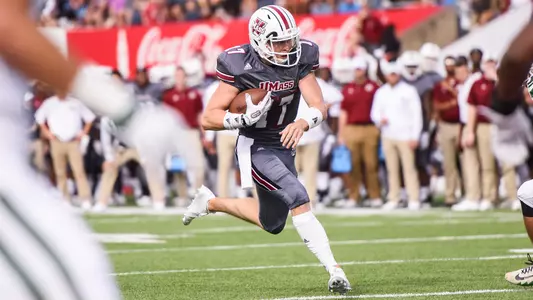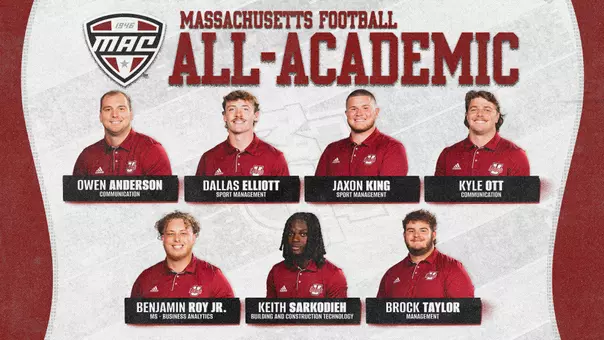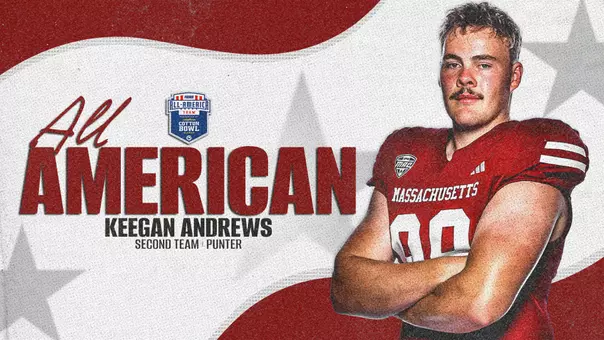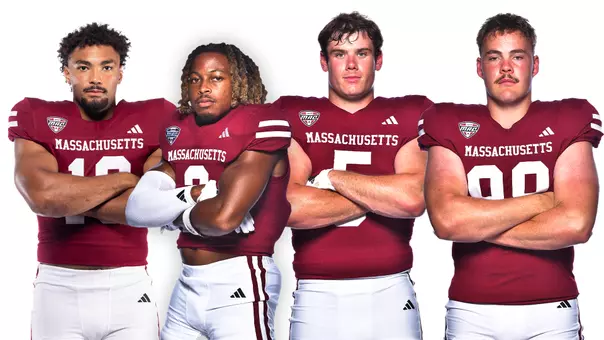University of Massachusets Athletics

Super-Senior Reflections: Michael Curtis
August 25, 2019 | Football
AMHERST, Mass. - University of Massahusetts football quarterback Michael Curtis is one of five redshirt senior student-athletes on the team, alongside Mike Caggiano, Kyle Horn, Randall West and Mike Yerardi. Caggiano, Horn, West and Yerardi arrived at UMass as classmates in 2015 while Curtis joined the group as a junior college transfer in Dec., 2016. Each of the five fifth-year team members will reflect on their time at the University of Massachusetts for UMassAthletics.com. Their entries will be posted throughout the week leading up to the season-opener at Rutgers on Fri., Aug. 30.
Michael Curtis • Redshirt Senior • Quarterback • Richardson, Texas • Trinity Valley Community College
What does it mean to you to get one more season at McGuirk Alumni Stadium?
"This definitely hits differently. I remember in high school it was similar when you go in as a freshman and you think about how this could be over in an instant. You have all those kids, all those teammates that didn't get the opportunity to play football at the next level. They were crying after their last game and it hits you hard.
"It's the same way when you go to college, you feel you're a freshman and it's so early and you have four or five years left to play and as years go by your sophomore and junior year it still hasn't really hit you, but then as this year begins you're still saying to yourself there is so much time left. You still work hard, but I've always been someone who has tried to work hard from freshman year onward, but now, I say it a lot to my roommates, we think about it all the time, 'I'm gone in four month. In four months, college is over for me.' To take that into account and to know that these are the last 12 or 13 games that I could possibly ever play, I think you take everything into account more; everything hits you differently. Not in a bad way, just in an appreciative way.
I'm thankful I've gotten to play this beautiful sport for 17 years and I know I have one more go-around with my brothers and best friends, and I get to make the most out of it with them. I think that helps everybody focus up a little more and stay away from things that don't matter; to focus on the little things, and the big things, that matter the most these next four months. Whether that be the games, the friendships with teammates, film study or doing whatever we can so when that last whistle rings, that clock hits zero in that last game we play, we know we got everything out of it we could and we put everything in it we had."
How does the route you took to get here make you appreciate your time here as you finish?
"My journey is something I take great pride in. In high school I was always a straight 'A' student, never made a 'B' and I had a lot of athletically-focused friends I played football or basketball with along with friends that were more academically-focused, so when I talked to people, everyone thought I was going to go here or go there. I was planning to go to Cornell and I switched to a private school for my senior year of high school that ended up shutting down during that year, and I lost eligibility because of that. It was a shock to me and everyone I was close with to think that 'this kid that has a 4.0 his entire life, is class president, he is choosing to go to a junior college instead of just going to a prestigious school for his grades while just not playing football at all.'
"That decision was one I had to sit down and talk to my family about. That if this is what I want to do with my dream to play Division I football. A lot of people don't know, but I was offered by a D-II school. The reason I wasn't eligible out of high school was because of a science credit and when it comes to D-II rules, you only need a certain number of years of science credits that I already had. I was offered and I committed at the D-II level.
"After that, I went home and thought about it, 'what are you getting out of this decision, goal-wise?' I wanted to maximize my experience and go to a place like Cornell and maximize academics and football, but sometimes it doesn't go that way. So I had to decide if I wanted to still chase my dream of football or chase my dream of academics. At the time, Division II was not going to do either. So I bet on myself and went to junior college, to a team I did not know much about at the time. A few days before signing day is when we all found out we weren't going to be eligible, so I went from thinking I was going to go to Cornell to two days later signing with Trinity Valley Community College in East Texas.
"Just going to Trinity Valley, I really learned to love football more; really learned that what our head coach, Brad Smiley, said at the time, 'it's just books and ball.' It was. You're in the middle of East Texas doing nothing but practicing, working hard and going to sleep. There is nothing extra-fun to do; there are no cool restaurants to go to, nothing. There's a taco bell, a McDonald's and football. I really think it taught a lot of us a different way to have passion for the game. You're playing, it's not on TV, no one knows about it except for your parents in the stands and the guys you're with. It brought more of a sentimental value to it and how much I really loved the game.
"When I was lucky enough to earn this scholarship to UMass and achieve my dream of coming to a D-I school. I had a bit of success last year and knowing how much fun that was, it really means a lot to me knowing that I do what I can to show my teammates and myself and everyone around me, just try to work as hard as I can whether people are watching or aren't watching, just so when I go home and lay my head down at night I'm doing everything I can to get the most out of it. So far, I'm thankful for the opportunities I've had and the people that have given them to me. Hopefully, I've done my best to excel in these opportunities."
What would you tell to the freshmen that are going to arrive after you've graduated?
"When you first come to college at 17, 18, 19 years old, I think, not that it's overwhelming, but you have the idea that there is just so much time. You always feel like there is enough time to get things done that you might not want to do right away.
I'm thankful, I think I learned this early on in junior college, just because you're fighting for that opportunity to go to the next place: do absolutely all you can so that when you go home and you're by yourself and look in the mirror, you can comfortably go to bed, you can live with yourself and look yourself in the face and say, 'I'm doing all I can to get what I want out of football, out of academics, out of life.' Whatever it may be that you truly hold dear to yourself, what's truly going to contribute to your success in life.
Football is a beautiful game; you face a lot of adversity. There are a lot of downs, a lot of ups, so many mountains, and rivers, and valleys. No one else truly knows how much work you are putting in except yourself. No one else truly knows what you're best effort is, what your best ability is, if you're maximizing out your potential. So as long as you can go home and look at yourself and say, 'I am doing everything I can.' When that inevitable day comes that'll happen to me in 12 or 13 games, that final whistle blows, you'll be upset you won't get to play the game you love anymore, but you'll be thankful that you did all you could to get the most out of it.
You don't want to be in a position walking away saying, 'Oh, if I had done this then things would be different.' You want to be able to say that you did all you could and it worked out amazingly or you didn't get everything you wanted out of it, but you did all you could to try to get it all. As you grow older and step into the real world that you can live with that a lot easier than being the guy watching football 10 years from now saying, 'man if I had just done this, or worked a little harder here, or gotten a little bigger, I could have been in the NFL for 10 years.'
"That's the biggest piece of advice I have: early on, have a standard for yourself so you know when you go home that you're doing everything you can. Sometimes other people might not think you are, and then there will be times people think you're doing way more than you need to do. As long as when you go home you can genuinely, truly feel you're doing everything you can to be the best 'you' that you can be in every aspect of life, I think you will not only enjoy your college experience, but all the years you have to live after college ends."
University of Massachusetts plays its first home game of the year on Sat., Sept. 7 against Southern Illinois at 3:30 p.m. Single game, season, group and Homecoming Weekend tickets for the 2019 season are available now. Tickets can be purchased through the UMass Athletics Ticket Office over the phone at 866-UMASS-TIX, online via UMass Athletics Ticket Central or in-person at the Mullins Center Box Office.
Follow University of Massachusetts football on Twitter, Instagram and Facebook (@UMassFootball).
Michael Curtis • Redshirt Senior • Quarterback • Richardson, Texas • Trinity Valley Community College
What does it mean to you to get one more season at McGuirk Alumni Stadium?
"This definitely hits differently. I remember in high school it was similar when you go in as a freshman and you think about how this could be over in an instant. You have all those kids, all those teammates that didn't get the opportunity to play football at the next level. They were crying after their last game and it hits you hard.
"It's the same way when you go to college, you feel you're a freshman and it's so early and you have four or five years left to play and as years go by your sophomore and junior year it still hasn't really hit you, but then as this year begins you're still saying to yourself there is so much time left. You still work hard, but I've always been someone who has tried to work hard from freshman year onward, but now, I say it a lot to my roommates, we think about it all the time, 'I'm gone in four month. In four months, college is over for me.' To take that into account and to know that these are the last 12 or 13 games that I could possibly ever play, I think you take everything into account more; everything hits you differently. Not in a bad way, just in an appreciative way.
I'm thankful I've gotten to play this beautiful sport for 17 years and I know I have one more go-around with my brothers and best friends, and I get to make the most out of it with them. I think that helps everybody focus up a little more and stay away from things that don't matter; to focus on the little things, and the big things, that matter the most these next four months. Whether that be the games, the friendships with teammates, film study or doing whatever we can so when that last whistle rings, that clock hits zero in that last game we play, we know we got everything out of it we could and we put everything in it we had."
How does the route you took to get here make you appreciate your time here as you finish?
"My journey is something I take great pride in. In high school I was always a straight 'A' student, never made a 'B' and I had a lot of athletically-focused friends I played football or basketball with along with friends that were more academically-focused, so when I talked to people, everyone thought I was going to go here or go there. I was planning to go to Cornell and I switched to a private school for my senior year of high school that ended up shutting down during that year, and I lost eligibility because of that. It was a shock to me and everyone I was close with to think that 'this kid that has a 4.0 his entire life, is class president, he is choosing to go to a junior college instead of just going to a prestigious school for his grades while just not playing football at all.'
"That decision was one I had to sit down and talk to my family about. That if this is what I want to do with my dream to play Division I football. A lot of people don't know, but I was offered by a D-II school. The reason I wasn't eligible out of high school was because of a science credit and when it comes to D-II rules, you only need a certain number of years of science credits that I already had. I was offered and I committed at the D-II level.
"After that, I went home and thought about it, 'what are you getting out of this decision, goal-wise?' I wanted to maximize my experience and go to a place like Cornell and maximize academics and football, but sometimes it doesn't go that way. So I had to decide if I wanted to still chase my dream of football or chase my dream of academics. At the time, Division II was not going to do either. So I bet on myself and went to junior college, to a team I did not know much about at the time. A few days before signing day is when we all found out we weren't going to be eligible, so I went from thinking I was going to go to Cornell to two days later signing with Trinity Valley Community College in East Texas.
"Just going to Trinity Valley, I really learned to love football more; really learned that what our head coach, Brad Smiley, said at the time, 'it's just books and ball.' It was. You're in the middle of East Texas doing nothing but practicing, working hard and going to sleep. There is nothing extra-fun to do; there are no cool restaurants to go to, nothing. There's a taco bell, a McDonald's and football. I really think it taught a lot of us a different way to have passion for the game. You're playing, it's not on TV, no one knows about it except for your parents in the stands and the guys you're with. It brought more of a sentimental value to it and how much I really loved the game.
"When I was lucky enough to earn this scholarship to UMass and achieve my dream of coming to a D-I school. I had a bit of success last year and knowing how much fun that was, it really means a lot to me knowing that I do what I can to show my teammates and myself and everyone around me, just try to work as hard as I can whether people are watching or aren't watching, just so when I go home and lay my head down at night I'm doing everything I can to get the most out of it. So far, I'm thankful for the opportunities I've had and the people that have given them to me. Hopefully, I've done my best to excel in these opportunities."
What would you tell to the freshmen that are going to arrive after you've graduated?
"When you first come to college at 17, 18, 19 years old, I think, not that it's overwhelming, but you have the idea that there is just so much time. You always feel like there is enough time to get things done that you might not want to do right away.
I'm thankful, I think I learned this early on in junior college, just because you're fighting for that opportunity to go to the next place: do absolutely all you can so that when you go home and you're by yourself and look in the mirror, you can comfortably go to bed, you can live with yourself and look yourself in the face and say, 'I'm doing all I can to get what I want out of football, out of academics, out of life.' Whatever it may be that you truly hold dear to yourself, what's truly going to contribute to your success in life.
Football is a beautiful game; you face a lot of adversity. There are a lot of downs, a lot of ups, so many mountains, and rivers, and valleys. No one else truly knows how much work you are putting in except yourself. No one else truly knows what you're best effort is, what your best ability is, if you're maximizing out your potential. So as long as you can go home and look at yourself and say, 'I am doing everything I can.' When that inevitable day comes that'll happen to me in 12 or 13 games, that final whistle blows, you'll be upset you won't get to play the game you love anymore, but you'll be thankful that you did all you could to get the most out of it.
You don't want to be in a position walking away saying, 'Oh, if I had done this then things would be different.' You want to be able to say that you did all you could and it worked out amazingly or you didn't get everything you wanted out of it, but you did all you could to try to get it all. As you grow older and step into the real world that you can live with that a lot easier than being the guy watching football 10 years from now saying, 'man if I had just done this, or worked a little harder here, or gotten a little bigger, I could have been in the NFL for 10 years.'
"That's the biggest piece of advice I have: early on, have a standard for yourself so you know when you go home that you're doing everything you can. Sometimes other people might not think you are, and then there will be times people think you're doing way more than you need to do. As long as when you go home you can genuinely, truly feel you're doing everything you can to be the best 'you' that you can be in every aspect of life, I think you will not only enjoy your college experience, but all the years you have to live after college ends."
University of Massachusetts plays its first home game of the year on Sat., Sept. 7 against Southern Illinois at 3:30 p.m. Single game, season, group and Homecoming Weekend tickets for the 2019 season are available now. Tickets can be purchased through the UMass Athletics Ticket Office over the phone at 866-UMASS-TIX, online via UMass Athletics Ticket Central or in-person at the Mullins Center Box Office.
Follow University of Massachusetts football on Twitter, Instagram and Facebook (@UMassFootball).
Players Mentioned
2025 Massachusetts Football - National Signing Day Press Conference | 12.03.25
Wednesday, December 03
UMass FB | Coach Joe Harasymiak Post Game Press Conference vs. Bowling Green | 11.25.25
Tuesday, November 25
2025 Massachusetts Football - Week 14 (Bowling Green) Thursday Press Conference
Thursday, November 20
UMass FB | Joe Harasymiak Post Game Press Conference vs Ohio | 11.18.25
Tuesday, November 18












